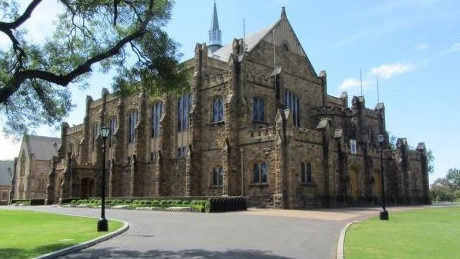Union accuses private schools of conspiring to push down teacher pay
Families with kids in Adelaide’s private schools could soon face higher fees if teachers get their pay rise. See what they earn.
Education
Don't miss out on the headlines from Education. Followed categories will be added to My News.
Independent schools are under pressure to significantly increase wages for teachers by up to 8 per cent, which would result in higher fees for parents.
Enterprise bargaining negotiations are underway across the non-government education sector, with one agreement covering the state’s 103 Catholic schools based on government school wages already approved.
Other schools facing demands for higher salaries than the Catholic system include St Peter’s College, Prince Alfred College, Walford Anglican School for Girls, Pembroke College, Pulteney Grammar, Seymour College, Scotch College, Westminster School and Wilderness School.
More than 30 Lutheran schools such as Concordia College, Immanuel College, Endeavour College, St Mark’s College at Port Pirie and Tatachilla Lutheran College will start wage negotiations within the next few months.
Prince Alfred College, Pembroke College, Scotch College and Westminster School are among those which have signed new wage agreements.
Independent Education Union SA secretary Glen Seidel said the union was attempting to break up a “two per cent wage cartel” between other schools which had developed during the pandemic.
“Employers locked arms and swore a blood oath not to exceed two per cent, lest the flood gates opened to fair and real wage outcomes,” he said.
“Now that the state of emergency is six months behind us, there are still many employers marching to the tune of their old two per cent mantra.”

Mr Seidel said the union was dealing with multiple layers of wage agreements across the independent non-government school sector.
“There are those who deferred enterprise agreement negotiations during Covid times and are now coming back to formal negotiations,” he said.
“Then there are those who did enterprise agreements despite uncertainties and locked in up to two per cent increases.
“They may be comfortable with that for another year or so.”
Mr Seidel said wage increases within independent schools inevitably led to higher school fees as the higher costs had to be passed on.
“The biggest cost line for a school is salaries,” he said.
“Schools are a people business, but a business nevertheless.
“You need to attract and retain good staff.”
Mr Seidel said current Commonwealth funding increases for independent schools were based on an annual indexation of 3.5 per cent, almost double the average wage increase of 2 per cent.
“A fact sheet detailing the funding says it ‘provides a minimum base and certainty for schools, while ensuring that funding reflects changes in wages and other costs’,” he said.
“It goes on to say: ‘Indexation is weighted towards changes in wage costs reflecting that teachers’ and staff salaries are a significant driver of schools’ costs’.”
“But schools are not passing this increase on and staff are going backwards at 5 per cent per annum based on a CPI of seven per cent and wage increase of two per cent.”
Mr Seidel said some “creative thinking is needed to break the general pay gridlock”.
“One model that has been agreed at a school is a CPI guarantee of up to five per cent, with a three per cent basic minimum increase each year for two years,” he said.
Mr Seidel said some schools already were “folding their arms at the bargaining tables”.
“They are going to a ballot on two per cent without agreement at the table and taking a chance on a ‘no’ vote getting up,” he said.
Mr Seidel said the resistance by independent schools to increase wages was “perplexing”.
“This is happening when schools are competing for scarce teaching staff, with national studies and reviews lamenting the undervaluing of the teaching profession,” it said.
“The schools have the power to do their bit for the profession and feather their own nest at the same time.”
Mr Seidel said it was “not as though” the IEU was “demanding CPI, plus”.
“We’d be happy with CPI minus ‘not too much’ and a bit of respect,” he said.
Independent Schools Association SA chief executive Carolyn Grantskalns said schools were “always sensitive to cost pressures on students’ families and households”.
“At the same time, staff must be fairly and appropriately paid to attract and retain the best,” she said.
“This can only be achieved through consideration, balance and fairness, which is why it is subject to a process of negotiation.”
Ms Grantskalns said independent schools were “looking forward to good faith negotiations that achieve the right result for all”.





